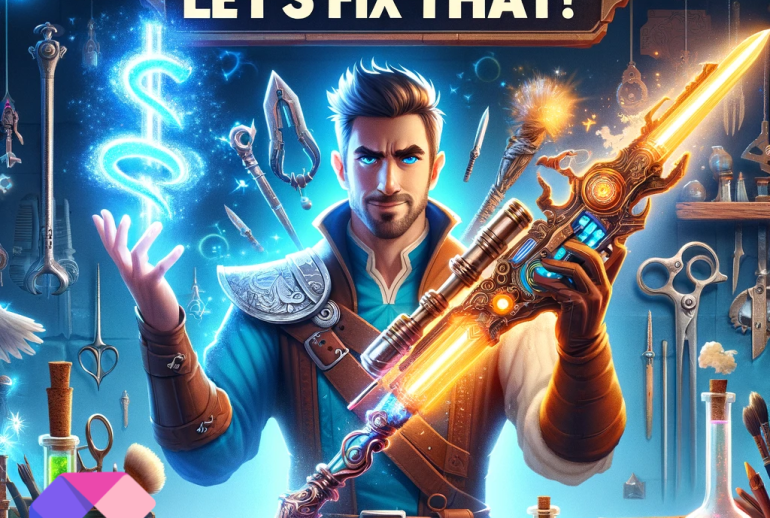Your main character needs a distinct weapon. How can you make something up that will entice readers?
If you write fantasy (or any genre where characters tend to have weapons), it’s important to make sure their weapon matches their personality and isn’t easily forgettable by giving them something unique, interesting, or even something flawed!
Adding in unique, interesting, and exciting weapons won’t only keep readers entertained, it might hook them into reading your book and it might even stick in their memory. Writing a memorable—in a good way, of course—book is a wonderful way to build a loyal fan following who reads everything you write.
Some writers forget to include exciting weapons, and that’s such a missed opportunity. If you want to know all the ways a distinct weapon can help your book, then you need to read this article. And don’t worry, the ideas aren’t only fantasy based. Honestly, any storyline where a weapon makes sense can benefit from this read.
Interesting, distinct character weapons can make—or break—your book
Writers are always looking for fun, unique ways to add depth, complexity, and conflict to their novels. Well, the right weapon can do just that.
If you can’t imagine how that would work, then you need to keep reading!
First, let’s cover some basics.
What genres can have weapons?
Well, they’re very popular in fantasy (and most subgenres of fantasy like urban fantasy and paranormal) and science fiction. They also come up in thrillers, war novels, and books like that, but those are more limited to real-world examples, unless they have a fantasy element.
So how can you add unique, interesting, or exciting weapons to your story? And how can weapons be utilized to create conflict, tension, and story depth?
Those are great questions to ask and we’ll answer them in this article!
How to make unique weapons and use them to create tension
To be clear, I’m talking about how to make weapons that look unique or have unique powers. For many authors, sticking with something that already exists is the easiest way to start. This gives room to explain in a way readers can visualize, rather than making something that no one’s ever seen before and trying to describe it. This can lead to readers being unable to picture the weapon in their mind and struggling to make sense of the imagery.
So start with the kind of weapon you want, then add some unique twist on it. A gun that uses the blood of the user as bullets means the user only has so many shots before the user collapses—every shot has to count.
An axe that’s made of living wood and vines that requires blood to stay sharp and strong means that, when there is no conflict, the user must get clever to keep it “alive.” Perhaps they cut their own hand in a pinch to keep the blade from withering and falling apart. Perhaps they use it on animals—if it accepts this kind of blood.
A scimitar that whispers who the user must kill next (demands their next victim) could be fun and a huge drawback. Perhaps it always requires enemy blood, but at one point it could instead demand the hero kill one of their friends or party members…
Sure, giving the weapon a unique look can be fun, but there are incredible ways to add more tension, conflict, and depth to even a weapon. Make that weapon a member of the party and have it not aligned with the party’s values, morals, ethics, or even their goals. That makes for seriously complex and fun reading.
Imagine a good main character with the hero archetype who has a cursed sword that, every time he uses it, shifts his balance a tiny bit toward evil. Or a magical gun that can only shoot evil in the hands of a bad guy. Or a scythe that steals the souls of those it kills in the hands of a deeply religious character who’s facing a room of good people commanded to kill them by an evil leader. Using a weapon to challenge a character’s core beliefs offers a chance for them to make hard choices that readers will feel for them for making. Life is full of hard choices. Why should that be different for your characters?
On a lesser level, a weapon that plays the character’s fears could be fun too. A lightning sword for a character deathly afraid of lightning could be fun. A staff that unleashes spiders on the enemy in the hands of an arachnophobe makes for interesting problem solving. A gun in the hands of a pacifist who has to make a decision to turn their back on their values or watch someone they love die…there are so many ways to make weapons bring gravity to a moment. The only limit is your imagination!
But… my fantasy book doesn’t have weapons…
That’s fine! But I would worry that things will get a bit… boring. How do your characters fight? If they use magic, give their magic drawbacks. Maybe one of them hates magic and was brought up in a home where magic equals evil… but they’re actually a mage. And in a moment of terror where lives are on the line, they’ll have to make a choice… use this evil to save those they care about or let their party die.
If they use regular weapons, find a way to include some unique characteristics at least. Maybe the dagger is always covered in blood, no matter how much they clean it. Maybe the staff is made with the last bit of a magical tree, and it only does damage in the hands of one person… otherwise, it’s just a stick that wouldn’t hurt a fly. Maybe your character is unique in that they use anything as a weapon—vines from a tree, a wooden chair, pottery, and their own body. That’s still unique and makes for some very interesting scenes that readers will enjoy reading to see how you get the character out of this mess.
The goal is to be interesting, to keep readers engaged, keep them reading and wanting to know what happens next. By adding a weapon that also builds suspense, you’re simply adding another layer for readers to peel back and enjoy.
What about my thriller novel?
This is a bit trickier. In thriller novels, guns or knives tend to be the weapons of choice. Giving a character unique weapons in more realistic or gritty fiction might mean a specific gun with a backstory or that isn’t commonly used. Or, in a novel where everyone uses knives, give your character brass knuckles instead, or a very interestingly shaped knife, or make it stand out from everyone else in some way. Give it a backstory too, to add depth. Like that knife was one the main character pulled out of their own chest and killed the bad guy with, or something like that. It’s okay to think outside the box. So long as you can explain why and how things work, you’re bound to be just fine.
How about science fiction weapons?
Again, it’s fun to make science fiction weapons unique.
Many sci-fi weapons are also based on existing technology, with their own unique twists. Guns with energy ammo, laser weapons, swords with pure energy for blades… the whole world is at your fingertips. Again, so long as you can explain how the weapon exists in a reasonably believable fashion, readers will be fascinated and excited to learn more.
Again, you can add in complexity here too. A gun with an AI, for example, who can refuse to shoot because of the AI’s personal values would be an interesting idea. This would create drama and conflict between the user and the AI, and this is even more interesting if the user didn’t know or the AI inserted themselves into the weapon in an attempt to foil a plot. (Just make sure you don’t write yourself into a corner here!) Or a gun that requires some kind of power to function, be it the electricity of human touch or an android, robot, or cyborg power source to function could add a twist readers would love. A scanner, grenade, or gun that disables the neurological synapses in people that could make people simply go unconscious (or even kill them) would be a great weapon in the hands of a villain, but would require you to get clever on how the hero manages to surpass this device.
There are so many ways to make a unique weapon that will drag readers into the story hook, line and sinker, that you’re really only limited by your imagination.
Weapons on their own
Obviously, there can always be a chance an enemy gets their hands on your character’s weapon. Maybe your character drops it, or their hand is cut off, or they’re bested in battle and taken captive. Always prepare for the possibility that a hero might toss their weapon to a friend or that a foe will find a way to abuse it. This can make for great storytelling, but it can also potentially be story-breaking, so keep that in mind when creating them.
Try to think outside the box, and lean on this underused, undervalued, often overlooked area, because all the ideas above could help elevate your book, idea, character, or story to the next level. Don’t be afraid to try something new.
I’d caution against making the weapon the main draw, of course. And don’t make the weapon overpowered; a good weapon should have a drawback, sometimes a major one, to make sure there’s still tension and conflict. An easy win isn’t a win, after all.
Happy writing!
The brainstorming tool can help record and generate unique story ideas.
✔ Capture your ideas with text or audio
✔ One secure location to store information
✔ Build on ideas for current and future use




